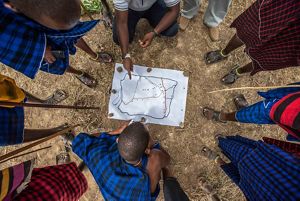The Freedom to Move
Pastoralists and wildlife in Tanzania depend on corridors of grass and water unimpeded by development.
A new award of more than $5.6 million from the UK government through the Darwin Initiative, combined with a matching gift opportunity from TNC’s Scale-Up Fund, will enable TNC and our partners to accelerate conservation across 3.6 million acres while improving the lives of Indigenous peoples who rely on these lands.
Northern Tanzania’s long dry season shrinks the Tarangire River to slender ribbons glinting across a wide, sandy bed, and toasts the region’s sea of grass to gold. As summer deepens, wildlife huddle in the sanctuary of Tarangire National Park, drawn to the stretch of river that flows through it and the dwindling reserves of food.
The Tarangire ecosystem is home to one of the largest mammal migrations on Earth—and it is the largest remaining unprotected swath of iconic East African savannah.
When blue-gray clouds bruise the northern sky, rain is falling in the mountains. Exodus begins. Herds of elephants and an army of wildebeest and zebra, two million strong, stream out of the park to follow ancient migration routes to pockets of forage and water in the highlands, some cutting around a 120-mile long arc northward to Amboseli National Park in Kenya.

More Than Parks
Because this ecosystem is fundamentally about movement, the national park alone isn’t enough for wildlife to survive. Not only must wildebeest, zebras, elephants and other grazers move beyond its boundaries in order to find enough nutritious forage, if they stay in the park they are at risk of deadly hoof rot disease due to the difference in soil type compared to surrounding areas.
In fact, 80% of the land that wildlife need fall outside of the national park and are shared by local communities, largely indigenous pastoralists who are just as dependent as wildlife on free movement to grass and water to keep their livestock—their sole livelihoods—alive.
Today, the historical balance and co-existence between wildlife and pastoralists is fraying as population growth, unsustainable land use practices, and climate change impacts degrade rangelands and increase pressures through resource scarcity and conflict. Movement routes are being cut off by roads, settlements, and other development.

Making Room for Grazing and Growth
In June 2009, a government policy called the Kilimo Kwanza Resolution (or “Agriculture First”) was enacted with the aim of growing the nation’s economy and increasing food security: Farm it or lose it. Pastoralists must either cultivate their ancestral lands or risk outsiders moving in to farm it, with no legal recourse to prevent them.
Though well-intentioned, the policy has had significant consequences for wildlife as well as pastoralists. Crop rows are quickly cutting into habitat and cutting off pathways to survival.
With our partners in the Northern Tanzania Rangelands Initiative (NTRI), we are working to support communities to secure formal communal land tenure rights. Together, we support community leaders through the lengthy, complex, and costly tenure application processes.
We provide data-rich maps and other science that they can draw on to create their own new land use maps that demarcate areas for farming and development expansion while setting aside room for communal grazing. In each case, communities have chosen to set aside land for wildlife to live and move.
At the same time, we support communities to derive more benefit from land that’s already been disturbed: more food from farms thanks to groundbreaking soil science, and more grass from pastures thanks to science-guided grazing practices.
A Focus on Pathways
Together, we have stitched together more than 3.6 million acres of communal grazing land under conservation agreements. Another 3 million acres of land is left legally unprotected and unconserved, and we are increasing our focus on “pinch points” in this landscape—pathways most urgently at risk of being severed by development and lost for good.
These agreements are a crucial first step on a journey to support these villages to optimize how they use their resources for themselves and wildlife, and to ensure that these benefits will withstand the pressures of population growth, unplanned development and climate change-driven drought.
New funding from the Darwin Initiative and TNC's Scale-Up Fund will enable us to do more of what has worked best—accelerate the pace of progress, and layer in strategies for building sustainability, both financial and structural.
Today, we are a big step closer to keeping these paths—these ancient arcs— open for generations to come.
Join the Journey: Consider donating to our critical work in northern Tanzania. Or, to learn more about the opportunity to have your gift matched by the Scale-Up Fund, please contact Cori Messinger at cmessinger@tnc.org.
We Can’t Save Nature Without You
Sign up to receive monthly conservation news and updates from Africa.





